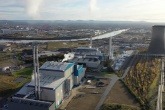CCC Report advises pace over perfection
The Climate Change Committee (CCC) has released its 2023 Progress Report to Parliament highlighting the overreliance on Energy from Waste (EfW), a lack of urgency in reaching net zero and confusing messaging around reducing UK emissions.
 The CCC is calling for the government to ‘stay firm’ on existing commitments to reach net zero by 2030 – while simultaneously stating that the Committee’s confidence in reaching this goal is now markedly less than it was a year ago.
The CCC is calling for the government to ‘stay firm’ on existing commitments to reach net zero by 2030 – while simultaneously stating that the Committee’s confidence in reaching this goal is now markedly less than it was a year ago.
Lord Deben, Chairman of the CCC, said: “The lesson of my ten years at the Climate Change Committee is that early action benefits the people of this country and helps us to meet the challenges of the coming decades more cheaply and more easily.
“Yet, even in these times of extraordinary fossil fuel prices, Government has been too slow to embrace cleaner, cheaper alternatives and too keen to support new production of coal, oil and gas. There is a worrying hesitancy by Ministers to lead the country to the next stage of Net Zero commitments.
“I urge the Government to regroup on Net Zero and commit to bolder delivery. This is a period when pace must be prioritised over perfection.”
The Association for Renewable Energy and Clean Technology (REA) has welcomed the CCC’s report and the calls for better transparency around emissions and the need to understand that ambitious targets are no substitute for real delivery.
In agreement with the report, the REA says that it recognises that glimmers of the net zero transition can be seen in growing sales of new electric cars and the continued deployment of renewable capacity, but that the scale-up of action overall is worryingly slow.
Additionally, the Association is calling on the government to implement the Resources and Waste sector reforms to ensure the UK is making the best use of its resources, contributing to net zero and producing valuable products to help protect our soils and decarbonise agriculture.
Dr Nina Skorupska CBE, Chief Executive of the REA, commented: “As is highlighted in the CCC’s report, the UK has indeed sent confusing signals on its climate priorities to the global community.
“We agree with the CCC’s criticism of the Government in the recent months of prioritising new fossil fuel exploration, while other advanced countries are providing renewed fiscal support and legislation to advance the energy transition, such as the EU Green Deal Package and the U.S. Inflation Reduction Act.
“It is clear that government should now use the upcoming Autumn Statement to respond to this report by delivering real policies designed to deliver against the Governments own power, heat, transport and circular economy targets. The budget must respond to significant policy gaps that remain and focus on creating an attractive market for low carbon investment.”
“The targets are there, but the government must now crack on with delivery.”
An overreliance on Energy from Waste
The report says that the continued growth in the use of EfW plants is undermining the efforts to reduce emissions within the waste sector.
It calls on incoming reforms following the consultation on recycling consistency in England to divert waste from EfW alongside improving recycling rates. The Government’s consultation response is expected imminently.
EfW emissions are currently higher than the Government’s Carbon Budget Delivery Plan (CBDP) and capacity is set to increase. The CCC is calling for an urgent comprehensive systems approach to control and reduce EfW emissions including a moratorium on additional EfW capacity.
UKWIN's National Coordinator Shlomo Dowen, responded to the recommendation for a moratorium: "Scotland took the wise step of putting a pause on approving incinerator planning applications while they considered the evidence. Both Scotland and Wales now have permanent incinerator moratoriums in place.
“For the sake of the climate and the circular economy, the UK Government must follow suit by immediately issuing a similar moratorium for England in line with the CCC's recommendations.
“Without such a halt, by the time the Government decides that a permanent moratorium is necessary, it may already be too late to stop the wave of planning applications currently going through the planning system.”
Additionally, improving recycling rates in England and Scotland – which the CCC report describes as ‘stalled’ – is highlighted as key to reducing dependence on both EfW and landfill. Further policies will also be needed to prevent biodegradable waste from going to landfill – which is still the largest source of emissions in the waste sector. The CCC says that clarity on these policies is ‘urgently needed’.
Carbon capture and storage cluster programme
Positively, the report highlights that good progress has been made in developing plans to support the first EfW facilities to install carbon capture technology as part of the industrial carbon capture and storage (CCS) cluster programme – but a more strategic approach to decarbonising the fleet is needed.
Mike Maudsley, CEO of EfW company enfinium, commented: “We strongly support the CCC’s call to rapidly decarbonise the waste sector.
“We can go further to support the UK’s decarbonisation. By deploying carbon capture, we could take over one million tonnes of carbon out of the atmosphere every year and store it permanently under the ground. We could also support the roll-out of new heat networks and electrolytic hydrogen from waste.
“To help us and the rest of the energy-from-waste sector make this a reality, it’s critical that the Government moves ahead with the expansion of the Track-1 CCS clusters later this year and includes carbon removals in the UK Emissions Trading Scheme from 2030.”
In general, the CCC says that greater strategic coordination of plans to decarbonise the waste sector is needed, including much greater emphasis on waste prevention, clarity on future residual waste capacity needs, the suitability of incentives and interactions with other sectors such as waste as a feedstock for Sustainable Aviation Fuels (SAFs).









